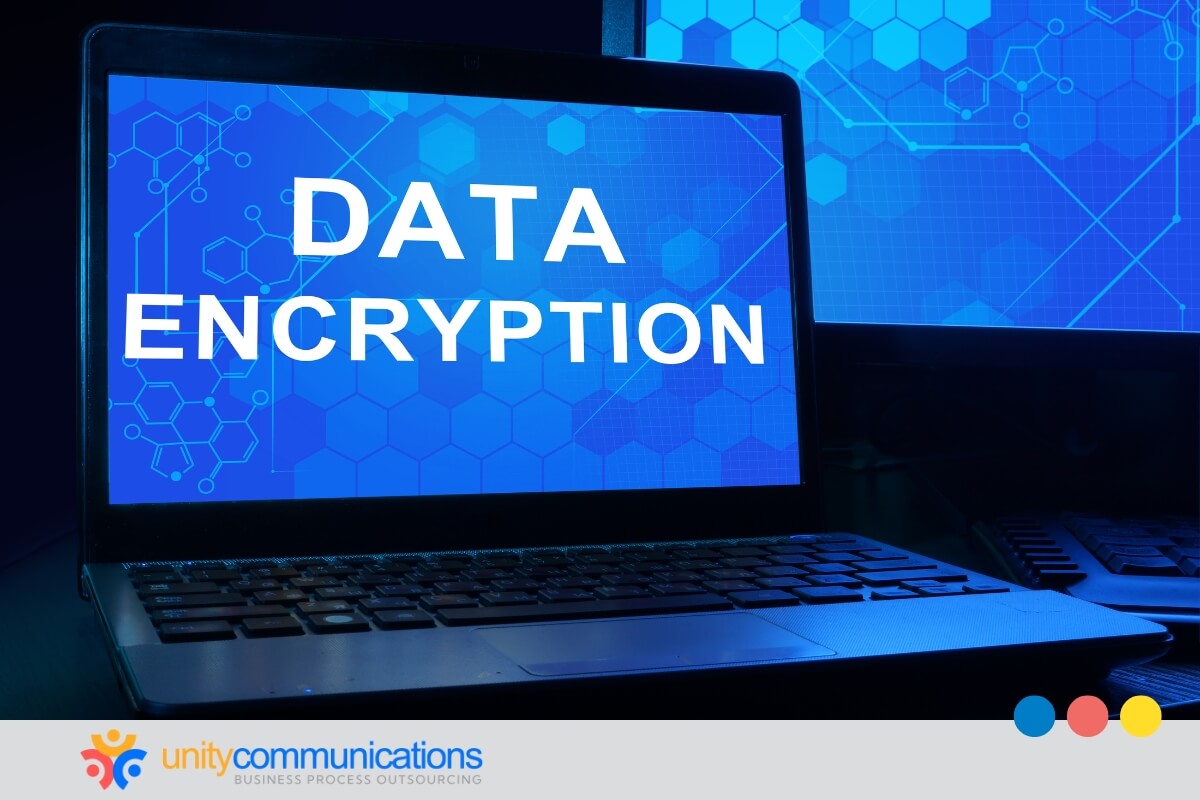Table of Contents
Today’s business environment has become increasingly digital. As the demand for outsourcing services continues to surge, upholding cybersecurity measures has never been more critical.
The business process outsourcing (BPO) industry consistently implements robust strategies to protect service providers, client companies, and consumers from cyber threats. Systems and protocols are well-integrated into BPO contracts and operations to ensure secure data management.
Continue reading to learn how vendors and clients collaborate to ensure secure outsourcing. This article explores cybersecurity in BPO contracts and operations.
Key cybersecurity measures in BPO contracts

Cybersecurity threats in BPO contracts pose risks to providers and clients, potentially compromising data, disrupting operations, and damaging reputations.
Some of the most prevalent cyber threats encountered in BPO agreements are data breaches, phishing attacks, insider threats, and malware infections. The prevalent forms of security incidents within BPO commonly include phishing, prompt bombing, credential misuse, complicit agent fraud, and agents outsourcing work.
Cybersecurity is critical to business process outsourcing agreements, underpinning trust, reliability, and operational resilience. BPO contracts often involve the exchange of sensitive data between outsourcing providers and client companies. Shared data might include proprietary business data, customer records, financial information, and intellectual property (IP).
Robust security measures are essential to safeguarding this data from unauthorized access, breaches, or theft. Additionally, they ensure confidentiality, integrity, and compliance with regulatory requirements such as the General Data Protection Regulation (GDPR) or the Health Insurance Portability and Accountability Act (HIPAA) of 1996.
Incorporating comprehensive cybersecurity measures to mitigate security risks and protect confidential data is essential when drafting BPO contracts. Here are key information security measures to include:
- Data encryption. Specify requirements for encrypting data in transit and at rest to prevent unauthorized access. Encryption algorithms and key management protocols should align with industry standards and regulatory requirements.
- Access controls. Define clear access control policies, including user authentication mechanisms, role-based access controls (RBAC), and least-privilege principles. Limit access to sensitive systems and data only to authorized personnel based on their roles and responsibilities.
- Security audits and assessments. Mandate regular security audits and assessments to evaluate the effectiveness of cybersecurity controls and identify potential vulnerabilities or compliance gaps. Define the frequency, scope, and reporting requirements for these examinations.
- Incident response and reporting. Establish procedures for reporting and responding to cybersecurity incidents promptly. Define roles and responsibilities for incident response teams, including escalation procedures, communication protocols, and post-incident analysis requirements.
- Data breach notification. Define clear protocols for notifying the other party during a data breach, including the time frame, scope of notification, and coordination of remediation efforts. Comply with relevant regulatory requirements regarding data breach notification.
- Vendor risk management. Require outsourcing providers to implement robust vendor risk management practices, including due diligence assessments, ongoing monitoring, and contractual obligations to adhere to cybersecurity standards and best practices.
- Security training and awareness. Emphasize the importance of cybersecurity training. Ensure both the outsourcing provider and client provide regular training on security best practices. According to 80% of organizations, security awareness training has effectively decreased their employees’ vulnerability to phishing attacks.
- Data handling and retention. Define guidelines for the handling, storage, and retention of data within the BPO environment. Specify classification requirements, retention periods, and secure disposal procedures to minimize the risk of unauthorized access or data leakage.
- Compliance requirements. Incorporate clauses related to compliance with relevant cybersecurity regulations, industry standards, and contractual obligations. Ensure both parties adhere to applicable data protection laws, such as the GDPR, HIPAA, and document compliance efforts.
- Dispute resolution and liability. Clarify responsibilities and liabilities during a cybersecurity incident or breach, including indemnification clauses, limitation of liability provisions, and dispute resolution mechanisms.
Integrating these cybersecurity measures into BPO contracts establishes a framework for collaboration that prioritizes protecting sensitive information and mitigates risks. Moreover, it fosters trust and accountability between outsourcing providers and clients.
Strategies for assessing cybersecurity risks in outsourcing operations

Identifying, evaluating, and mitigating potential threats in outsourcing operations is just as critical. Below are strategies to evaluate cybersecurity risks in BPO services:
- Risk assessment framework. Develop a comprehensive risk assessment framework tailored to your outsourcing services and associated cybersecurity risks. Consider the type of data being handled, the complexity of the outsourcing arrangement, the geographic location of service providers, and regulatory compliance requirements.
- Vendor due diligence. Conduct thorough due diligence on outsourcing vendors to evaluate their cybersecurity posture and capabilities. Assess factors such as security certifications, industry reputation, past security incidents, internal security policies and procedures, and the effectiveness of their security controls.
- Security questionnaires and audits. Use security questionnaires and audits to gather detailed information about the outsourcing vendor’s security practices and infrastructure. Include questions related to data protection measures, access controls, incident response procedures, employee training, and compliance with relevant regulations.
- On-site assessments. Conduct on-site assessments or security reviews at the facilities of outsourcing vendors to evaluate physical security measures, network infrastructure, and adherence to security policies and procedures. This step allows for firsthand observation of security controls and provides insights into potential vulnerabilities.
- Security service-level agreements (SLAs). Define clear security SLAs that outline the cybersecurity standards and performance metrics expected of outsourcing vendors. Include provisions for monitoring compliance with security requirements, reporting security incidents, and remediating security vulnerabilities.
Cybersecurity best practices for BPO providers

Cybersecurity is critical for BPO companies to maintain trust, safeguard client data, and ensure operational resilience. But what is the role of BPO providers in ensuring cybersecurity within operations?
Here are some best practices explicitly tailored to BPO providers:
- Establish a robust security culture. Foster a culture of cybersecurity awareness and accountability throughout the organization. Provide regular training and awareness programs for employees to educate them about cybersecurity risks, best practices, and their roles in maintaining a secure environment.
- Implement multi-layered security controls. Deploy a comprehensive suite of security controls to protect against different cyber threats. Measures include firewalls, intrusion detection/prevention systems (IDS/IPS), antivirus software, endpoint protection, and web filtering.
- Conduct penetration testing and vulnerability assessments. Conduct regular penetration testing and vulnerability assessments to identify weaknesses in systems and applications. This process helps uncover potential security flaws that attackers could exploit and promotes timely remediation of vulnerabilities.
- Create data backup and disaster recovery plans. Implement regular data backup procedures and disaster recovery plans to maintain the availability and integrity of critical data in the event of a security breach or system failure. Test backup and recovery processes regularly to verify their effectiveness.
The bottom line
Cybersecurity in BPO contracts embodies a strategic imperative for organizations seeking to thrive in an increasingly interconnected and digitized world. Data security measures include encryption, access controls, security assessments, and incident response training.
By embedding cybersecurity principles into outsourcing partnerships, organizations can fortify defenses, protect assets, and foster a culture of resilience in the face of cyber threats.
Let’s connect if you want to learn more about how outsourcing can secure your operations.




